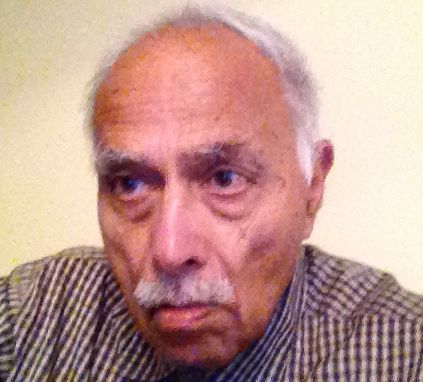Memories of Muktsar: 1942
Category:
Tags:

Dr. Anand - an unholy person born in 1932 in the holy town of Nankana Sahib, central Punjab. A lawyer father, a doctor mother. Peripatetic childhood - almost gypsy style. Many schools. Many friends, ranging from a cobbler's son (poorly shod as the proverb goes) to a judge's son. MB From Glancy (now Government) Medical College Amritsar, 1958. Comet 4 to Heathrow, 1960.
Long retired. Widower. A son and a daughter, their spouses, five grandchildren, two hens (impartially, one black, one white) keeping an eye on me as I stand still and the world goes by.
1942. A little town called Muktsar, located in what was Ferozepur district at that time (now in Sri Muktsar Sahib district, created by splitting Ferozepur). In the Punjab, not far from today's Pakistan.
My mother was posted as a doctor in the government hospital in Muktsar - the only woman doctor for miles and miles. A slow train would pass through countryside, where wind would whip up sandstorms, and whirl up and move sand hillocks. Sometimes the sand, suspended in the atmosphere, would leave the sun shooting its rays in to the sand, producing intense heat but not too much light.
My father was a lawyer, practising in Shahdara, near Lahore, at that time. Instead of dismantling his practice there and starting from scratch in Muktsar, he maintained a flat in Lahore, and travelled down to Muktsar for the weekend.
I was then ten years old, and had suddenly started to grow physically - and in confidence. One day, my brother told me that his teacher had sworn at him. Nothing uncommon in those days\; nevertheless, I decided to do something about it. I marched up to the offending teacher, warned him that I would take up the matter with the head teacher and up to the District Inspector of Schools. The teacher apologised and begged me to drop the complaint. The episode raised my self-confidence and more importantly, my school mates became friendlier.
The little town had its own electricity generating station, oil fired. Except that the war consumed the oil, leaving the town without electricity. We used kerosene oil lamps, called Hurricane Lanterns in English, Laaltan in Punjabi. The laaltan had a little deewa with a cotton wick sucking up sarson da tail तेल (‘t' in tail is a soft t\; mustard oil)
There was a water purification plant - called the Water Works. It needed electricity to pump the water. No electricity. Hence, no water in the pipes running to your house, the school, or the hospital. That there were no street lights was never noticed. The hand held electric torch was a valuable aid to life. Potholes on the "roads", and snakes on the roads, on paths, in the kitchen, the bath room (if you had a bathroom). The toilets were on the roof. A small enclosure, sometimes with a tin roof. The bhangi (cleaner) came every day to clean the toilet and remove the night-soil.
Water was delivered by a Maashki who carried a Mashak - a big bag made of buffalo hide, rather than cow hide. The Maaskhi was a Muslim\; the water was for the bath.
Water was also delivered by a Hindu or Sikh in brass vessels, or in an iron pail called the baalti बाल्टी (‘t' pronounced like tea). This water could be used for drinking, cleaning teeth, cooking, or of course, for bathing.
There were two small tallas, (‘t' pronounced with the tongue between the tips of your teeth\; ponds). In Urdu, the word for talla is talaab.
Occasionally my mother had to examine and produce "medico-legal reports" on women who had been assaulted or raped. (Yes, even in those days women were raped). My mother had to go to the District Headquarters to give evidence in the court of a magistrate first class or the additional district magistrate.
Inevitably, once in a while, an emergency would prevent my mother from arriving at the railway station on time to catch the train to the District Headquarters. The station master would even hold up the departure by about five to ten minutes to allow her to get on the train.
Still, occasionally, my mother did miss the train. Fortunately, the road ran parallel to the railway track. My mother would get into a tonga - a two-wheel contraption, pulled by a single horse, hitched to the tonga between two beams. The driver sat on the front right side of the seat on an empty tonga but would shift to the right hand beam leading from the main part to make space for passengers, if needed. The tongas would wait for the customers at the tonga Adda (station.)
Once she was in the tonga, and the driver knew she had missed the train, he would crack his whip - though not sadistically. The tonga would go flying to the next station - where my mother would catch the train.
The tonga would carry you wherever there was a road of sorts. The bullock cart would carry you on the dirt tracks between villages or between the town and villages, especially if there was merchandise to be conveyed.
The main intercity transport on the roads was by lorries. Passengers were also carried by ‘lorries'\; bus was a term used sparingly. The 'bus stops' and 'coach stations' of today were called Addas, for example, Ferozepur da Adda (Ferozepur's bus stop.)
Then there was the oonth (camel) in the Punjabi of Lahore. I never travelled by camel but my mother, visiting patients needing to be delivered at home in a village, often did.
______________________________________
© Joginder Anand 2015
Comments
Add new comment